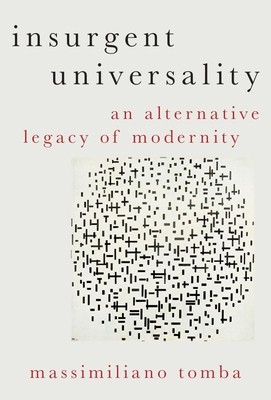
- We will send in 10–14 business days.
- Author: Massimiliano Tomba
- Publisher: Oxford University Press, USA
- ISBN-10: 0190883081
- ISBN-13: 9780190883089
- Format: 14 x 21.1 x 3.1 cm, kieti viršeliai
- Language: English
- SAVE -10% with code: EXTRA
Reviews
Description
Scholars commonly take the Declaration of the Rights of Man and Citizen of 1789, written during the French Revolution, as the starting point for the modern conception of human rights. According to the Declaration, the rights of man are held to be universal, at all times and all places. But as recent crises around migrants and refugees have made obvious, this idea, sacred as it might be among human rights advocates, is exhausted. It's long past time to reconsider the principles on which Western economic and political norms rest.
This book advocates for a tradition of political universality as an alternative to the juridical universalism of the Declaration. Insurgent universality isn't based on the idea that we all share some common humanity but, rather, on the democratic excess by which people disrupt and reject an existing political and economic order. Going beyond the constitutional armor of the representative state, it brings into play a plurality of powers to which citizens have access, not through the funnel of national citizenship but in daily political practice. We can look to recent history to see various experiments in cooperative and insurgent democracy: the Indignados in Spain, the Arab Spring, Occupy, the Zapatistas in Mexico, and, going further back, the Paris Commune, the 1917 peasant revolts during the Russian Revolution, and the Haitian Revolution. This book argues that these movements belong to the common legacy of insurgent universality, which is characterized by alternative trajectories ofmodernity that have been repressed, hindered, and forgotten. Massimiliano Tomba examines these events to show what they could have been and what they can still be. As such he explores how their common legacy can be reactivated. Insurgent Universality analyzes the manifestos and declarations that came out of these experiments considering them as collective works of an alternative canon of political theory that challenges the great names of the Western pantheon of political thought and builds bridges between European and non-European political and social experiments.
EXTRA 10 % discount with code: EXTRA
The promotion ends in 23d.15:20:12
The discount code is valid when purchasing from 10 €. Discounts do not stack.
- Author: Massimiliano Tomba
- Publisher: Oxford University Press, USA
- ISBN-10: 0190883081
- ISBN-13: 9780190883089
- Format: 14 x 21.1 x 3.1 cm, kieti viršeliai
- Language: English English
Scholars commonly take the Declaration of the Rights of Man and Citizen of 1789, written during the French Revolution, as the starting point for the modern conception of human rights. According to the Declaration, the rights of man are held to be universal, at all times and all places. But as recent crises around migrants and refugees have made obvious, this idea, sacred as it might be among human rights advocates, is exhausted. It's long past time to reconsider the principles on which Western economic and political norms rest.
This book advocates for a tradition of political universality as an alternative to the juridical universalism of the Declaration. Insurgent universality isn't based on the idea that we all share some common humanity but, rather, on the democratic excess by which people disrupt and reject an existing political and economic order. Going beyond the constitutional armor of the representative state, it brings into play a plurality of powers to which citizens have access, not through the funnel of national citizenship but in daily political practice. We can look to recent history to see various experiments in cooperative and insurgent democracy: the Indignados in Spain, the Arab Spring, Occupy, the Zapatistas in Mexico, and, going further back, the Paris Commune, the 1917 peasant revolts during the Russian Revolution, and the Haitian Revolution. This book argues that these movements belong to the common legacy of insurgent universality, which is characterized by alternative trajectories ofmodernity that have been repressed, hindered, and forgotten. Massimiliano Tomba examines these events to show what they could have been and what they can still be. As such he explores how their common legacy can be reactivated. Insurgent Universality analyzes the manifestos and declarations that came out of these experiments considering them as collective works of an alternative canon of political theory that challenges the great names of the Western pantheon of political thought and builds bridges between European and non-European political and social experiments.


Reviews